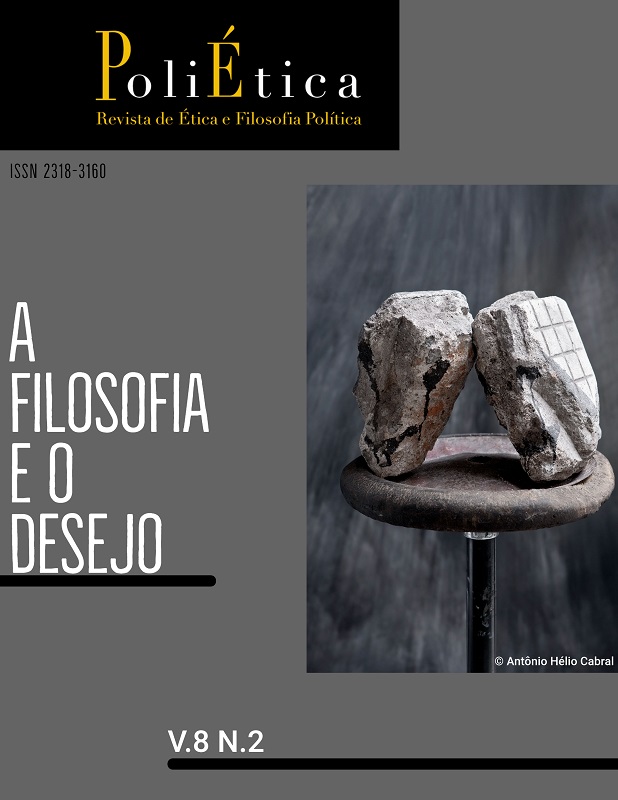Genealogy of the Body and Conscience: Notes on the Psychology of guild and resentment in Nietzsche
DOI:
https://doi.org/10.23925/poliética.v8i2.51169Keywords:
Nietzsche, genealogy, body, consciousness, psychologyAbstract
In this text, I reflect on a theoretical perspective that has been consolidating itself in a very promising way in Brazilian archeology, especially for engaging different voices around themes that until the beginning of the 21st century did not usually occupy the agenda of archaeological praxis. The Queer Theory has been unveiling a universe of possibilities for a politically engaged academic practice with resonance in the present. In this text, I will not present ready-made models or recipes, as I understand that Queer narratives are anti-normative, non-essentialist and critical, therefore plural, negotiable, fluid, in addition to reflecting many issues that affect us in the present. My proposal is to subsidize, from my place of speech, the reflections I am making about some Queer approaches, basing my reflections on the thinking of pioneers and pioneers who have already traveled the path that we have yet to travel in the field of archeology.The article discusses a series of concepts developed by Nietzsche throughout his philosophical production, and especially in the work Genealogy of Morals. It begins with the genealogy of the body, which is understood as the result of the constant relationship of forces (active and reactive), where the cartography of these forces is made. From Nietzsche’s thought and Deleuze’s interpretations, it is explained how a consciousness was created in the human, which until then was guided by instincts.
Then, the production of consciousness and its functioning unfolds through the concepts of guilt, bad conscience and resentment, which will also contribute to the theoretical formulation of a philosophical perspective on Nietzschean psychology.
References
AGOSTINHO. Comentário literal ao gênesis. In: Comentários ao gênesis. Tradução: Agostinho Belmonte. São Paulo: Paulus, 2005. p. 15-498. (Coleção Patrística, n. 21).
AZEVEDO, V. D. Nietzsche e a dissolução da moral. São Paulo: Unijui, 2003.
BARRENECHEA, M, A de. Nietzsche e o corpo. Rio de Janeiro: 7Letras, 2009.
DARWIN, C. A origem das espécies. Tradução: Mesquita Paul. vol.1. Porto: Lello & Irmão – Editores, 2003.
DELEUZE, G. Nietzsche e a filosofia. Tradução: Edmundo Fernandes Dias, Ruth Joffily Dias. Rio de Janeiro: Editora Rio, 1976.
DESCARTES, R. Meditações metafísicas. 2. ed. São Paulo: Abril Cultural, 1979.
ESPINOZA, B. Ética. Tradução: Tomaz Tadeu. Belo Horizonte: Autêntica Editora, 2009.
NAFFAH NETO, A. A Psicoterapia em busca de Dionísio: Nietzsche visita Freud. São Paulo: EDUC/Escuta, 1994.
NIETZSCHE, F. W. Fragmentos póstumos. Tradução: Oswaldo Giacoia Junior. Campinas: IFCH/UNICAMP, 1996. (Textos didáticos, n. 22).
NIETZSCHE, F. Aurora: reflexões sobre os preconceitos morais. Tradução: Paulo Cézar de Souza. São Paulo: Companhia das Letras, 2004.
NIETZSCHE, F. Crepúsculo dos ídolos: ou como se filosofa com o martelo. Tradução: Paulo César de Souza. São Paulo: Companhia das Letras, 2006.
NIETZSCHE, F. Sobre verdade e mentira no sentido extra-moral. Tradução: Fernando Moraes Barros. São Paulo: Hedra, 2007.
NIETZSCHE, F. A vontade de poder. Tradução: Marcos Sinésio Pereira Fernandes, Francisco José Dias de Moraes. Rio de Janeiro: Contraponto, 2008.
NIETZSCHE, F. O anticristo: maldição contra o Cristianismo. Tradução: Renato Zwick. Porto Alegre, RS: L&PM. 2009. (Coleção L&PM Pocket, n. 721).
NIETZSCHE, F. A Gaia ciência. Tradução: Paulo Cézar de Souza. São Paulo: Companhia das Letras, 2011a.
NIETZSCHE, F. Assim falou Zaratustra: um livro para todos e para ninguém. Tradução: Paulo César de Souza. São Paulo: Companhia das Letras, 2011b.
NIETZSCHE, F. Genealogia da moral: uma polêmica. Tradução: Paulo Cézar de Souza. São Paulo: Companhia das Letras, 2012.
PLATÃO. Fédon. São Paulo: Nova Cultural, 1996. (Coleção Os Pensadores).


